Fenway Park (41 page)
Authors: John Powers
There was no joking the following night when the Yankees breezed to a 13-2 decision (aided by seven Boston errors) with a scoreline—2600210—that prompted one press-box imp to dial that number in New York. “No one was home,” Peter Gammons reported in the
Boston Globe
. “Perhaps he was out looking for playoff tickets.”
After a 7-0 loss, and then a 7-4 defeat in the finale, the Sox saw a season’s work vanish in a weekend. “I’m not happy and I’m not worried,” proclaimed second baseman
Jerry Remy. “We’re tied and we shouldn’t be. But we’re not going to roll over and cry.”
Indeed, despite dropping 13 of 16 games during their September swoon, Boston rallied heroically, winning its final eight dates with Detroit and Toronto. (Tiant shut out the Blue Jays, 5-0, on two hits at Fenway on the final day.)
When the Indians hammered Hunter and the Yankees, 9-2, Boston found itself in a one-game playoff for the first time since 1948, when it met Cleveland at Fenway. “There is no way any of us right now can appreciate or even understand how it came to this,” said Burleson. “But what we do know is that this is the biggest day of our lives.”
For six innings, the division title appeared within grasp after Boston had nicked Ron Guidry for two runs. But with one swing, the least likely Yankee, light-hitting Bucky Dent, lofted what seemed to be a harmless two-out fly ball to left. Torrez, assuming that the inning was over, walked off the mound. “Then I looked over my shoulder on the way to the dugout and couldn’t believe it,” he said. “Yaz is back to the wall, popping his glove, looking up. I said, ‘What’s this? What the . . .’”
It was a three-run homer that put the visitors ahead, 3-2. The Yankees would take a 5-4 lead into the final frame. With two out in the bottom of the ninth, Burleson stood on third representing the tying run. But Yastrzemski, whose homer originally put his team ahead, popped up to third and the season was gone. The Yankees went on to win the World Series again and the Sox simply went home. “We won, but you didn’t lose,” New York owner George Steinbrenner told the disconsolate Sox, but none of them believed him. “We just blew it, that’s all,” said Burleson.
It was a particularly bitter ending for Yastrzemski, who craved not only his third pennant, but also his first championship ring. “Someday we’re going to get that cigar,” declared the 39-year-old captain, who’d wept in the clubhouse after watching the last ball off his bat drop into Graig Nettles’s glove. “Before old Yaz retires, he’s going to play on a world champion.”
Except for Eckersley, who went on to claim a ring with Oakland in 1989, none of the players on that Red Sox team ever did. By the time the 1979 season began, Tiant had taken his rhumba delivery to the Yankees as a free agent and Lee and his extraterrestrial aura had been dealt to the Expos. Still, optimism reigned as author John Updike (who 19 years before had penned “Hub Fans Bid Kid Adieu,” the famous farewell essay to Ted Williams) wrote an Opening Day story for the
Globe
describing the “first kiss of another prolonged entanglement.”
But while the Sox started briskly, winning 12 of their first 16 games to lead the division by two-and-a-half games, they were demolished, 10-0, at home by the Yankees in their first meeting with Torrez on the mound and Dent, who was heartily hooted on sight, knocking him out of the game. “I turned on the radio this morning and heard that the season was over,” said Drago, whose team-mates were booed the next day when they came out for infield practice.
Despite magnificent seasons from Lynn (a league-leading .333 batting average with 39 homers and 122 RBI) and Rice (.325, 39, 130), Boston never saw first place again and finished third, 11½ games behind Baltimore.
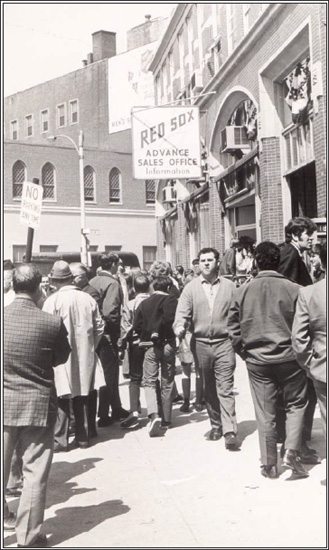
Opening day always drew a crowd in the 1970s.
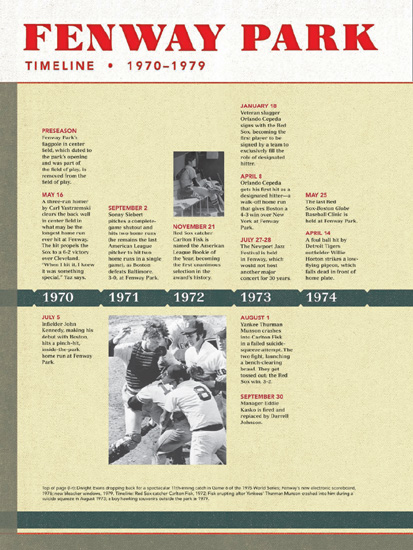
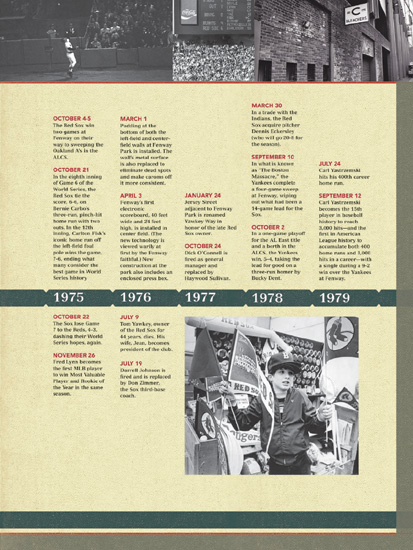
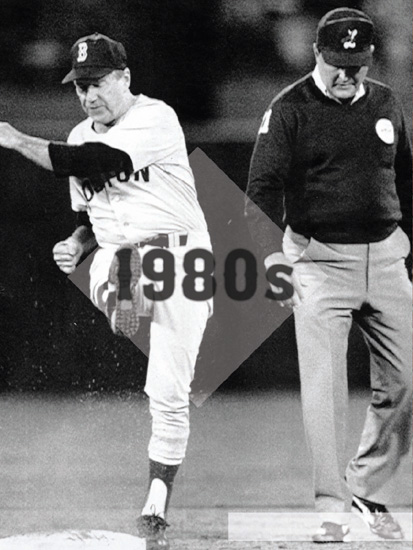
Red Sox manager Joe Morgan fumed after Rich Gedman was called out for crashing into Oakland’s Mike Gallego at second base during Game 3 of the AL Championship Series in 1988.
T
he signature moments of the decade—on the diamond at least—occurred a couple of weeks and thousands of miles apart—in Anaheim, California, and in Queens, New York. But swirling around the historic Dave Henderson homer and the haunting Bill Buckner gaffe of 1986 were plenty of Fenway Park vignettes, both celebratory and shocking. Seemingly for the want of a stamp on an unmailed contract offer, native son and stalwart catcher Carlton Fisk walked away from the team in 1981. Soon after, the luxury-box era debuted at Fenway, and ultimately 40 of the revenue-producing suites were built on the ballpark roof. In 1983, an ugly ownership rift was exposed on a June night that had been reserved for celebrating the wondrous 1967 pennant and one of its stricken heroes. In the fall of that same season, Captain Carl, who had kept his feelings in check for pretty much his entire 23-year career, said farewell with an emotional lap around the ballpark. On a cold April 1986 night, Boston’s “Rocket Man,” Roger Clemens, was propelled into the spotlight by a record 20-strikeout game, the opening salvo in his first Cy Young Award season. Sparked by the “Hendu” home run, the Sox made the World Series for their only time of the decade; it had been 11 years since they had been there, and it would be 18 more before they returned. When the team foundered in 1988, Joe Morgan, the bullpen coach, assumed the duties as manager on an “interim” basis. But the Sox took off on a remarkable run, winning a leaguerecord 24-straight home games. All the while, Morgan, who hailed from nearby Walpole, kept things on a “six, two and even” keel as he guided the team to the playoffs twice in three years. Once in the postseason, though, his Sox struggled mightily—their losing streak, which began with Game 6 of the 1986 World Series, would last 13 games and 12 seasons.
T
he club never got rolling in 1980. Stalwarts like Jim Rice, Fred Lynn, Carl Yastrzemski, and Butch Hobson were among the lame and the team was stuck in fifth place at the All-Star break. At the end of September, when attendance had dropped by 400,000, management dumped Manager Don Zimmer with a year left on his contract. “A change was needed and we made it,” said General Manager Haywood Sullivan, who promoted Johnny Pesky from coach to manager for the rest of the season. “Economics has something to do with it, fan reaction, public relations, on-the-field things. Let’s be fair about it, sometimes change creates attitude. I’m looking for a little different tone, that’s all.”
Zimmer, whose 411 victories in four-plus seasons still put him in the top seven in club annals, was sanguine about his dismissal. “I’ve heard a lot of boos,” acknowledged the man who’d never been fired nor held a job outside of the game. “I’ve made a lot more friends than I have enemies in my stay here. That certainly holds true in the clubhouse. This has been a good club to manage. A damn good club.”
What the front office wanted, Sullivan stated, was “a strict disciplinarian, a solid baseball man and a motivator.” The choice was Ralph Houk, a decorated Army major who’d directed the Yankees to consecutive World Series championships in the early 1960s, and then returned to oversee their reconstruction before moving on to Detroit, where he took on another renovation job before retiring to Florida. “My golf game didn’t get very good,” Houk said upon returning to baseball. “The fish weren’t biting. How often can you cut the grass?”
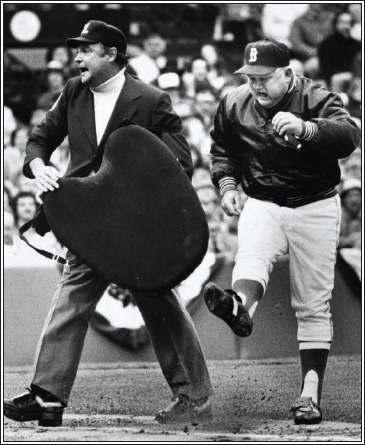
Red Sox manager Don Zimmer kicked at the dirt after being ejected by umpire Marty Springstead on April 14, 1980.
Houk was a transition specialist, which made him a natural fit for a 1981 Boston club that had lost three prominent regulars—Fred Lynn, catcher Carlton Fisk, and shortstop Rick Burleson—during the off-season. Burleson was traded with Butch Hobson to the Angels for Carney Lansford, Rick Miller, and Mark Clear. Fisk and Lynn took advantage of a baffling oversight by the Boston front office to switch uniforms; because management hadn’t offered them new contracts by the December deadline before their option year, Fisk and Lynn were able to declare themselves free agents.